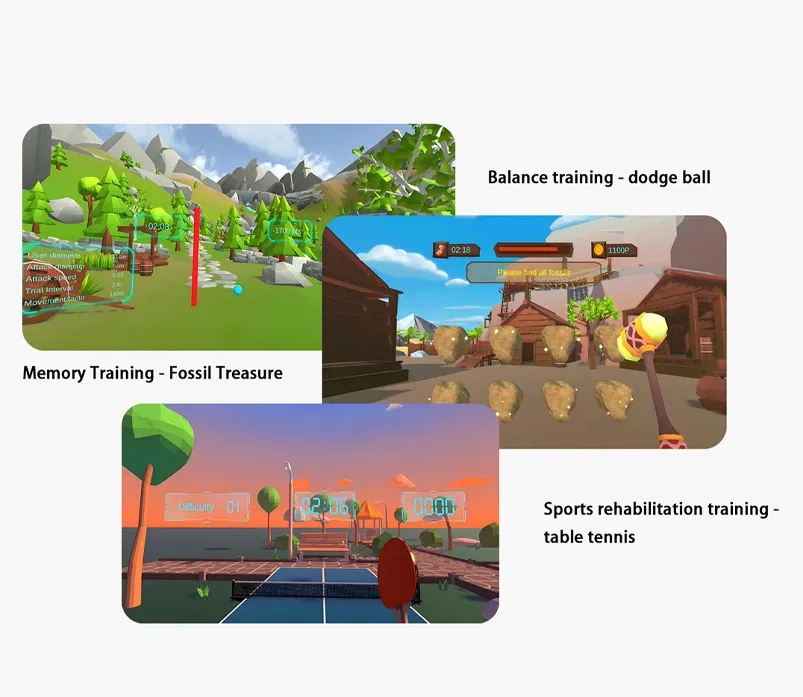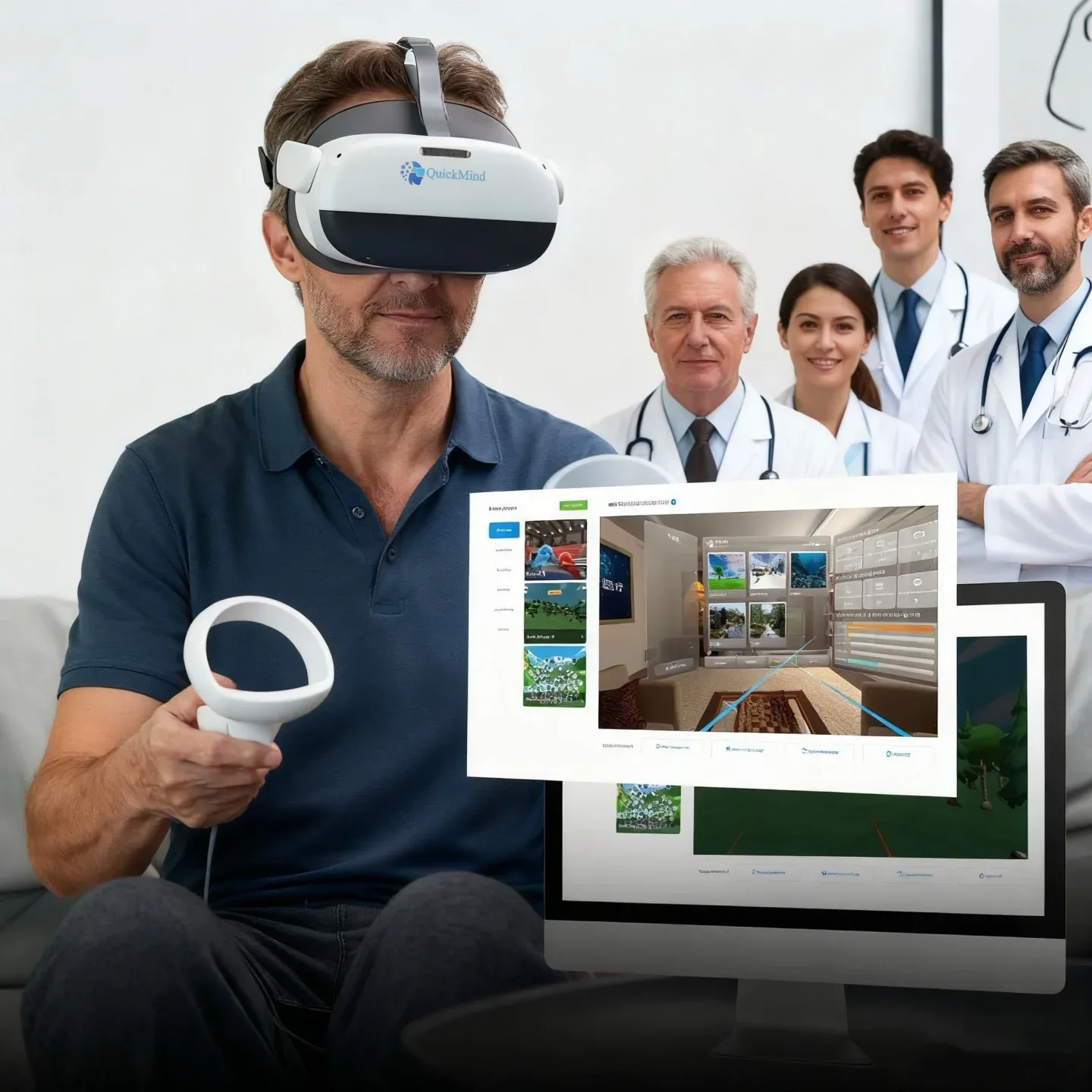
Progressive studies shows that VR technology strategy can markedly refine the conditions of participants coping with cognitive impairments. By moving them to relaxing atmospheres, VR grants a exclusive avenue for cognitive stimulation, mood control, and group participation. A variety of examinations have indicated that VR therapy can mitigate agitation, unease, and depression in dementia patients individuals while also enhancing their memory, mindfulness, and dialogue proficiency.
- VR enables persons with dementia to recollect cherished memories through engaging emulations.
- Also, it can supply a protected and helpful space for community involvement, fostering a consciousness of relationship and belonging.
- Experts propose that VR therapy has the promise to reshape dementia therapy by giving new and cutting-edge means to manage the complex difficulties faced by users affected by this syndrome.
Cutting-Edge Digital Interventions for Alzheimer's Disease
Advancing virtual methods are exhibiting benefits in the territory of mental improvement for people managing Alzheimer's disease. These applications tap into digital innovation to invigorate brain processing and potentially reduce the evolution of the condition. Engaging activities, personalized mentoring, and brain-computer training are some representations of plans being considered in this flourishing sphere. While investigations are progressing, digital therapeutics enable a auxiliary course for boosting the states of those struggling with Alzheimer's dementia.Virtual Scenario Navigation in Alzheimer's Treatment
In relation to people suffering from neurodegenerative Alzheimer's type, the continuous weakening of recollection and psychological faculties can greatly weaken their power to socialize with the external setting. This impairing state often produces in remoteness, frustration, and a reduced ego recognition. Fresh enhancements in virtual reality technology unveil a groundbreaking opportunity to mitigate these issues by developing immersive experiences that can activate the brain and strengthen cognitive function.
Computer-generated surroundings created specifically for Alzheimer's individuals can take them in acquainted places, such as their childhood abode or a admired outdoor area, stirring positive memories and reducing anxiety. Through interactive endeavors, these virtual universes can also engage cognitive abilities like remembrance, attention, and judgment.
The expected outcomes of virtual reality in Alzheimer's management are massive. Early analyses have revealed constructive results, with users experiencing improvements in cognitive skills, mood, and overall quality of life. As this technology develops, it holds the key to revolutionizing the way we approach Alzheimer's disease, affording a new pathway for management and motivation.
Virtual Recollection Therapy for Alzheimer's
Reminiscence therapy is a commonly used technique used to advance cognitive function and quality of life in individuals with Alzheimer's disease. This customary form of therapy involves eliciting patients to remember past experiences, often through communication. However, a advanced approach is emerging: VR-mediated reminiscence therapy.
This immersive technology utilizes virtual reality headsets to immerse patients in authentic environments that bring forth memories from their past. By immersing in these virtual scenes, individuals with Alzheimer's can connect with their past in a powerful way.
The Potential of Virtual Reality to Improve Memory and Cognition in Dementia
Virtual reality (VR) is emerging as a up-and-coming resource in the fight against dementia, supplying advanced ways to boost memory and cognition. By building immersive realities, VR can support individuals with dementia access memories, interact in meaningful activities, and strengthen cognitive aptitudes. Studies have proved that VR interventions can cause considerable improvements in memory recall, attention, and cognitive awareness. Moreover, VR provides a safe and inviting space for individuals with dementia to share, reducing feelings of isolation and fear.
- Furthermore, VR can be modified to individual needs and preferences, permitting greater levels of communication.
- Notwithstanding the potential of VR, extended research is needed to fully understand its long-term impact in dementia care.
Reawakening Past, Forging Connections: VR's Power in Alzheimer's Socialization
Immersive simulated realms is emerging as a trailblazing platform in the sphere of Alzheimer's disease. By crafting participatory and responsive platforms, VR has the potential to stimulate memories, encourage social interaction, and raise the overall quality of life for participants suffering from Alzheimer's. Arguably the most notable aspects of VR is its ability to convey users to vintage venues and experiences from their past. Whether it's a stroll in a childhood home or a depiction of a beloved holiday, these virtual explorations can invoke happy memories and bolster cognitive performance. Furthermore, VR can assist social interaction by joining individuals with others who share similar experiences. This can be particularly useful for people with Alzheimer's who may deal with hardship with traditional social connection. By hosting a safe and interesting virtual space, VR can minimize feelings of isolation and loneliness, which are common among people living with Alzheimer's. Overall, VR holds immense power for innovating the lives of clients with Alzheimer's by reviving memories, strengthening connections, digital therapy and enhancing their quality of life. As technology evolves to grow, we can expect even more revolutionary applications of VR in the field of dementia care.Leveraging Cognitive Training: Using VR to Manage Alzheimer's Conditions
Virtual reality is rapidly emerging as a state-of-the-art tool in the realm of cognitive training, particularly for people living with Alzheimer's disease. By immersing patients in interactive and engaging virtual environments, VR-based interventions can improve cognitive functions such as memory, attention, and problem-solving. These games routinely incorporate elements of storytelling, exploration, and social interaction, making the training process greatly immersive. Studies have shown that VR-based cognitive training can lead to measurable improvements in cognitive performance, theoretically delaying the progression of Alzheimer's symptoms. Moreover, VR provides a safe and controlled environment for patients to practice new skills and build their confidence.
- Game-driven approaches in VR training can make it extremely immersive and fun for persons with mental decline.
- VR simulations can offer authentic scenarios that encourage and raise cognitive functions.
- Personalized VR experiences can cater to unique demands and approaches.
A Simulated Second Chance: Exploring the Benefits of VR Environments for Individuals with Dementia
Engaging simulated worlds offer a unique and advantageous avenue for users with cognitive impairments. These methodologies can recreate familiar environments, allowing those affected by cognitive decline to relive cherished memories and support a sense of contentment. By easing the burdens of dementia, VR platforms have the promise to boost quality of life for both clients and their helpers.
- Investigations indicate that VR approaches can favorably impact cognitive function, sentimental well-being, and even kinetic abilities in individuals with dementia.
- Moreover, VR enables a safe and controlled environment for examination, reducing the risk of damage.
- Additionally, VR can advance social bonds by allowing individuals with dementia to interact in computer-generated activities with others.
Game-Changing VR Solutions for Early Alzheimer's Assessment
neurodegenerative Alzheimer's type manifests a difficult problem, often persisting unseen in its early stages. Nevertheless, virtual reality (VR) is materializing as a revolutionary tool for initial identification. Through immersive simulations, VR can measure cognitive operation in ways that traditional methods struggle to. This ability allows for speedy involvement strategies, potentially stalling disease progression and enhancing the quality of life for clients with Alzheimer's.
- Immersive virtual tests evaluate cognitive functions like recall and focus in protected settings.
- Tailored VR programs enable patients to partake in mental activation tasks.
- Interactive virtual contexts enable socialization and interaction for Alzheimer's patients.
Enhancing Dementia Communication and Social Interaction Via VR
{In the realm of dementia care, innovative technologies are emerging to enhance the lives of people affected by dementia. Virtual reality (VR) is one such technology that holds immense potential for connecting individuals with dementia through improved interaction and communication. By providing enthralling virtual settings, VR can activate cognitive function, reduce behavioral issues, and ultimately improve the overall well-being of people living with dementia.
VR experiences tailored to dementia care can range from retrospection therapy sessions that bring individuals into past familiar contexts, to interactive games that promote social interaction and cognitive training. Furthermore, VR has the competence to connect clients facing dementia with social networks, regardless of physical isolation, fostering a sense of solidarity.
- VR can aid in reducing agitation and anxiety by providing a calming and enticing environment.
- Studies have shown that VR interventions can lead to improvements in cognitive function, mood, and social interaction in participants with dementia.
- As technology progresses to advance, we can expect even more innovative and {effective|beneficial|helpful|powerful|impactful|successful|productive|efficient
